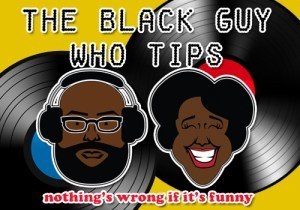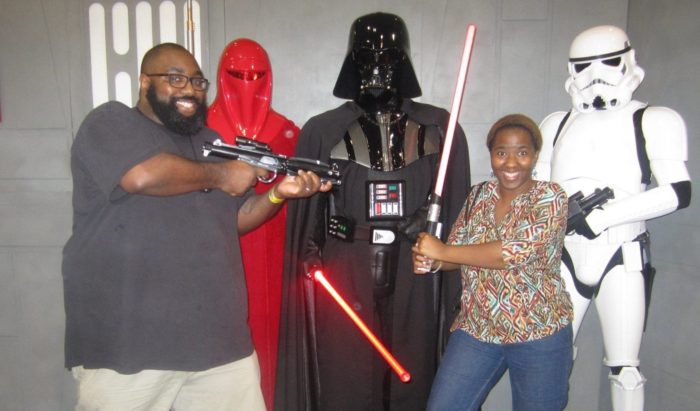Ever feel like you wish you could sit down with some of the amazing podcasting pros of color and pick their brains beyond the mic? We had the opportunity to do just that while at the inaugural PodCon. First in our Pod Only Knows series is the comedically honest The Black Guy Who Tips, a podcast hosted by real-life married couple Rod “Rodimus Prime” and Karen Morrow whose motto is “nothing’s wrong if it’s funny.”
Black Nerd Problems: What was it that drew you to podcasting as a specific medium?
Rod Morrow: We were both big podcast fans, still are. We probably listen to—
Karen Morrow: Hundreds!
RM: Yeah, I probably have at least a hundred in my phone right now. So we were definitely inspired by this podcast “Keith and the Girl”, and they were just two regular people recording a podcast and they had jobs and they were just talking about life. After I got laid off my first time, we were like, “We should start a podcast! And once we get the technology we should invite people on via Skype or the phone.” That was what really got us interested; listening to other people and wanting to contribute our own opinions in a space, where at the time, there weren’t very many Black opinions.
BNP: What inspired the casual style? There’s so many styles, and sometimes people are afraid of the casual style because they think they might ramble. What drew you to that?

KM: These are conversations we would have had anyway. Like the conversations people hear are the exact same conversations we have in the car or on the street. The thing is, Roderick works full time for the podcast so he’s the one who keeps us structured, moving topic to topic to topic to topic. You can make it feel like a free-flowing conversation and still have structure.
RM: I’m glad that it sounds like that, though, because that means my planning is working because I want it to sound like you just walked into a cookout and you’re just sitting with family members that you actually wanna see. We used to have music in the background when we first started, and it was really like someone was playing spades would’ve been the only thing that would’ve changed it. It’s easy. We don’t have to edit as much as other shows. Sometimes people put too much rigidity and it gives them this hollow feeling like you don’t really know them. They’ve edited themselves out of the show. I used to know a guy that would edit out all his “uhs,” “ums,” and pauses, so he would have this solid block of audio like a robot or something, you know? That’s not how people talk.
BNP: What made you want to do the long form versus a short form?
RM: Well it used to be shorter!
KM: We first started with 30 to 45 minutes a week, once a week, and we did from once a week to twice a week and to three times a week and now we do five days a week. As it grew we began to grow and we began to talk more. At first it was no rules or regulations and I wasn’t as talkative at first because I didn’t know… Being a woman and being on a microphone is kinda intimidating. And so Roderick would talk talk talk and I wouldn’t talk as much as if the mic was off initially.
RM: She would… listen. We would do a show and before the show we would be in the car or something and she would be like, “Oh yeah! And this and this!” and I would be like, “I can’t wait to do this show tonight” and we’d do the show and she’d be quiet. And then after the show, soon as we’re done, she’d be like, “Y’know, that was crazy!” And I’d be like, “Why didn’t you do that on the show?” Once she became more comfortable it was also easier to do more shows. My goal is to make her have to work the least. She’s coming in and hearing these articles for the first time, she’s reacting to them fresh and the audience is, too, so when you talk about her exclamations that’s funny because many times the audience is having those exclamations. She’s the nexus. She’s the bridge to all of that.

Anyways, we did long form because we couldn’t shut up and we love talking to each other. There’s so little editing for us that we can crank that episode out that night. There’s not one way to do podcasts. Maybe my competition isn’t Serial. Maybe it’s The Steve Harvey Show because Steve Harvey talks three hours a day and somehow he’s still on the air.
BNP: What’s a podcast suggestion, because you mentioned you listened to hundreds, that someone might not expect from you?
RM: Obviously “Keith and the Girl”, which is two white people in New York. The “Struggle Bus” podcast which is two feminists and very intersectional. Podcasts provide a window to go learn– someone’s literally offering this information.
KM: I think for me it’s “Black Ass Podcast”. She’s a comedian and she’s hilarious but it’s really fun to see how her mind ticks. Sometimes people can do a one person show and it’s not entertaining because they don’t have anybody to bounce off of. I love it!
RM: “Uncivil” ’cause everybody gonna expect you to say “Black Ass Podcast”.
KM: (laughs) My bad! My bad. Scratch that. “Uncivil”. They talk about the Civil War but things you don’t learn about in textbooks. So they about “40 acres and a mule”, but then they tell you how did they get started and then they tell you that they still have some Black people fighting for their land.
BNP: You mentioned a little bit in the panel about being a Southern Black woman with all these intersections. I’m wondering, what is it like navigating in this field?
KM: Something about us is we’ve actually surrounded ourselves with other Black podcasts, so to some extent we’ve insulated. There’s a difference between that and “coming out of whiteness” because there’s a lot of Black people who are surrounded by it and they go, “Well, I want to do something different. I’m tired of this whiteness,” and then break out. We were already on the outside, so we “stayed on the outside”. For us, we do have white listeners, and they’ll write in and say, “I have a child and I want to teach my child how to be better than I was” or “I want to learn to be a better ally”.

RM: (joking) We’re making better white people. I’ll say from watching her, though, we used to get feedback about Karen’s accent and, “Why can’t she speak like this or that”? We don’t want to have an NPR voice. We made a joke once called, “This Black American Life”. But Karen, as you can see, is extremely passionate and extremely outspoken and yeah, certain Black people would hear it and it was almost like a shame. It was like all the way back to Gone With the Wind and the Black mammy stereotype when you’re listening to an intelligent, professional woman. What is wrong with having her accent? Having an accent ain’t stopped Paula Deen from making them biscuits.
KM: Come on! Ain’t stop her! N’er a bit!
RM: I’m also from the South so my accent comes out sometimes but Karen did better than me in school and people will assume because my accent isn’t as thick.
KM: The South is a whole area of people that actually want their voices heard too.
RM: There’s also this idea that because we’re Southern it’s like, “If it weren’t for that racism, I’d be Republican!”–that type of stereotype of us.
BNP: Why was it important for you to come to the first PodCon?
RM: We got invited, which was cool, but I think a lot of people–like marginalized people–will do this thing where we complain about not being invited but then if they’re gonna invite us, I know they’re doing the right thing. Everything they sent I just said yes. Every panel. We also got to meet people we probably wouldn’t have gotten a chance to meet.
KM: We had people coming out bearing gifts, saying, “We’re here because of you”. It made me feel good to know that people heard and seen what I was saying because I think expanding people’s hearts is a good thing.
RM: And it’s almost like voting, unless you go vote you can’t really complain. A lot of times white people don’t really know the difference and they’re like, “Oh, check the box!” This year I’ve been trying to reach out and do more.
BNP: So you start your shows with lyrics. I’m really curious, what is the intersection of hip-hop and podcasting?
RM: Podcasts are kinda like hip-hop, or like when rock and roll started, ’cause we can do what we wanna do. Like the freestyle element where you can change it on the fly. Not to toot our own horn, but to me [creating a new segment] is like the first person who was like, “Oh, spin that record back around!” or “Let’s play the breakbeat over and over all night.” Some of the things we do that a lot of shows do now that I don’t even know if they knew started with us, we’ll read our five star reviews on the air. We do a feedback show, but as far as we know we were the first show to really dedicate time to that. But that kinda reminds me of hip-hop a little bit, because early it didn’t have a form. It may become corporate and end up formulaic.
If Oprah or Tyler Perry decided tomorrow, “I’mma buy all the Black podcasts!”, it would change the landscape, a lot of people’d have to go delete they episodes. It’s wild and free right now and people don’t even know what to do with copyright for music. It’s that raw still but it’s over 10 years old! When it gets regulated it’s probably gonna be trash.

KM: The thing about regulation is, it always affects minorities the most because white people have learned, “Oh, I can benefit from this” and it’s like, “Let’s get rid of all the brown people”.
BNP: My last question is what are some things you would encourage young, Black nerd podcasters?
RM: Do not run from your Blackness!
KM: Right.
RM: I think we have been conditioned to think that the default of something is to take away what makes us unique. If you’re Black and you’re covering something don’t be afraid to bring that perspective. That being said, balance it out because it can’t be good times all the time. It can’t be depressing all the time. Every once in a while I have to turn it off and be like, “I’m gonna watch The Flash or Arrow and not even think about depictions of Curtis or Diggle.” Allow a little space for fun.
KM: My thing is, don’t mimic whiteness. Most white nerd culture is very angry and very mad and they gotta pick everything apart and I gotta question the nerd in you.
RM: There’s a pressure always to perform and I want us to pull it in. It’s very important to make a show where people feel comfortable to come in. We’re still in this together whether we want to be or not.
Are you following Black Nerd Problems on Twitter, Facebook,Instagram, Tumblr, YouTube or Google+?



Show Comments